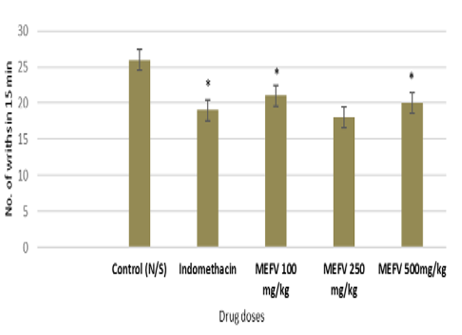Abstract
Fucus vesiculosus is a seaweed rich in various phytochemicals. Although it has documented systemic effects such as anti-inflammatory, anti-viral and anti-oxidant, the effects on pain have not been evaluated. This study is aimed at evaluating the analgesic potential of this plant. Methanolic extract of the whole dried plant was prepared by maceration technique and was subjected to phytochemical screening. Phytochemical screening yielded positive results for flavonoids, saponins, tanins and steroids. Mice were divided into five groups (n=5). Normal saline 0.9%, 2ml (negative control), Indomethacin 10 mg/kg (positive control) and extracts at 100 mg/kg, 250 mg/kg and 500 mg/kg were administered orally to mice in their respective groups. The latency to pain was assessed at 0, 30, 60 and 90 minutes for each animal using the hotplate protocol. The latency to pain was increased in groups who received Indomethacin (10 mg/kg) and extracted at all doses (100,250,500 mg/kg) when compared to the negative control (0.9% N/S). However, the results were statistically significant (p-value < 0.05, < 0.001) for Indomethacin and extract-treated groups at 250 mg/kg and 500 mg/kg dose. Acetic induced writhing demonstrated analgesic activity at 100, 250 and 500 mg/kg treated doses, which were statistically significant (p-value < 0.05) when compared with the negative control. Our study has demonstrated the central and peripheral analgesic potential of fucus vesiculosus methanolic extract. The specific active constituent and effects at cellular level need to be evaluated.
Full text article
Authors

This work is licensed under a Creative Commons Attribution-NonCommercial-NoDerivatives 4.0 International License.

